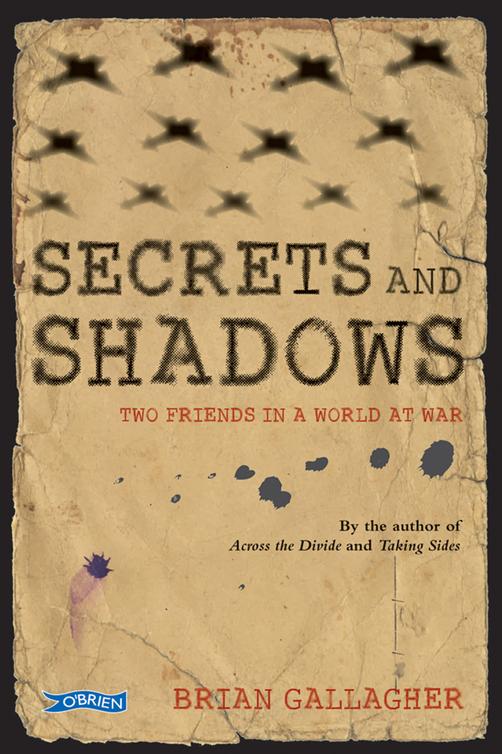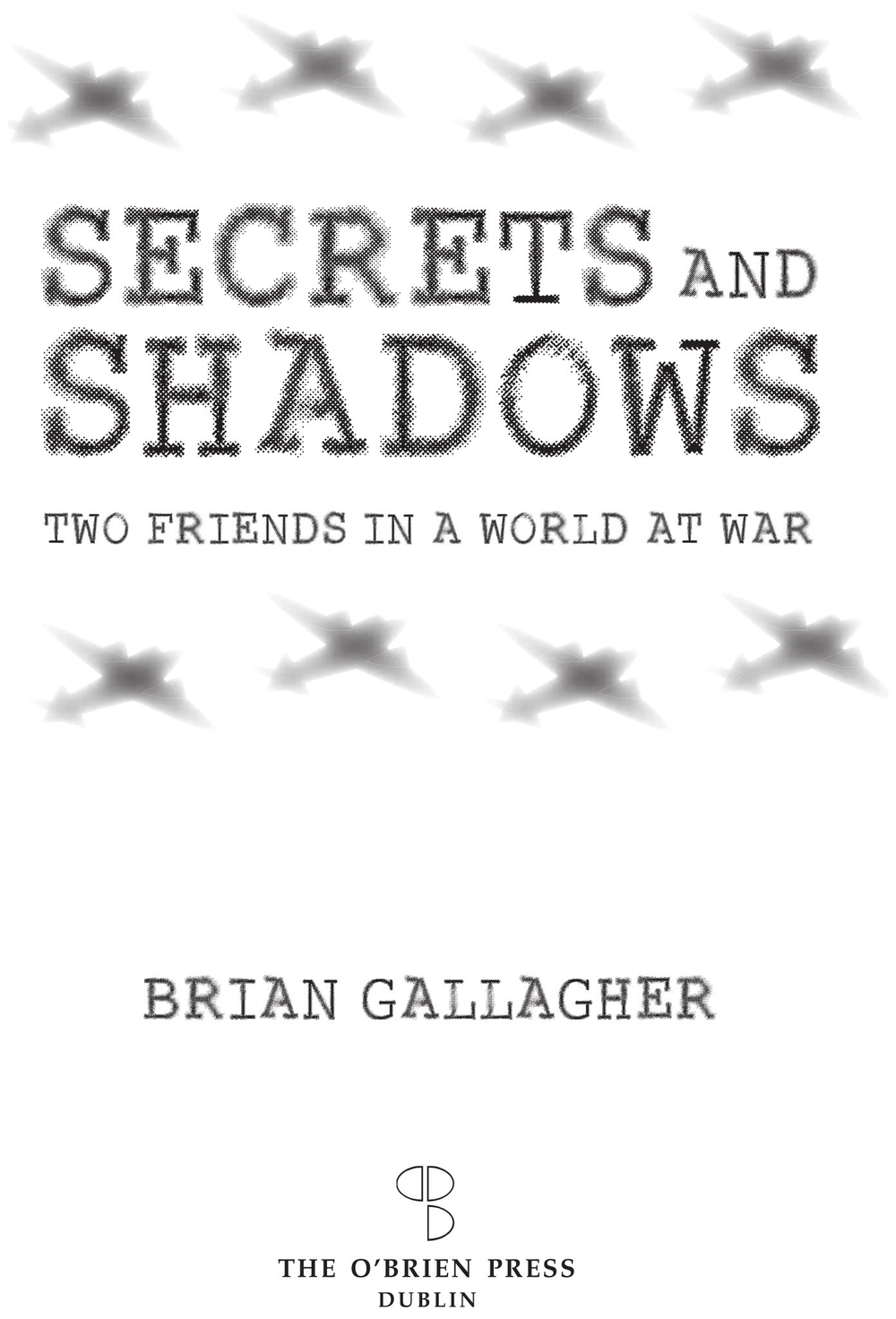Secrets and Shadows
Read Secrets and Shadows Online
Authors: Brian Gallagher


Praise for Brian Gallagher’s books:
Across The Divide
‘The atmosphere of a troubled city awash with tension and
poverty is excellently captured’
Irish Examiner
‘A compelling historical novel’
Inis Magazine
‘Highly recommended’
Bookfest
Taking Sides
‘An involving, exciting read … a first class adventure’
Carousel Magazine
‘Gripping right from its first page …
dramatic action and storytelling skill’
Evening Echo
‘riveting’
Sunday Independent

- Title Page
- DEDICATION
- ACKNOWLEDGEMENTS
- PROLOGUE: 3 MAY 1941.
- PART ONE:
ARRIVALS - CHAPTER ONE
- CHAPTER TWO
- CHAPTER THREE
- CHAPTER FOUR
- CHAPTER FIVE
- CHAPTER SIX
- CHAPTER SEVEN
- CHAPTER EIGHT
- CHAPTER NINE
- CHAPTER TEN
- PART TWO
SUSPICIONS - CHAPTER ELEVEN
- CHAPTER TWELVE
- CHAPTER THIRTEEN
- CHAPTER FOURTEEN
- CHAPTER FIFTEEN
- PART THREE:
PROOF - CHAPTER FIFTEEN
- CHAPTER SIXTEEN
- CHAPTER EIGHTEEN
- CHAPTER NINETEEN
- CHAPTER TWENTY
- CHAPTER TWENTY-ONE
- CHAPTER TWENTY-TWO
- EPILOGUE
- HISTORICAL NOTE
- About the Author
- Other books by Brian Gallagher
- Copyright
To the soirée members – Clare, Eugene, Eilish, Declan, Anne and Jerry – a great group of friends.
My sincere thanks to Michael O’Brien for his enthusiastic support and suggestions when I proposed a children’s historical novel set during the Second World War, to my editor, Mary Webb, for her customary insight and advice, to publicist Ruth Heneghan for all her efforts on my behalf, and to the entire staff at The O’Brien Press, with whom it’s a pleasure to work. I’m grateful once more to Annie-Rose O’Mahony and Sean Pardy, two young readers who generously took the time to read the first draft of the book and share their thoughts with me.
My thanks also go to the Arts Council for their bursary support, to Tommy Coyle, Paddy Kelly and Brendan Sheehan at Stanhope Street Convent, to the staff in Pearse Street Library, to Joe Foley for information about Cobh, to Aoife Lucy for research on rationing in 1941, to Cathy Roberts of Fort Perch Rock, New Brighton, for help and advice regarding Liverpool during the blitz, and to Hugh McCusker for his meticulous proof-reading. And, as ever, the greatest thanks of all go to my family, Miriam, Orla and Peter, for their unflagging support.

B
arry had never felt so frightened. He ran out the hall door, horrified to see that tonight Liverpool was ablaze. The city where he had spent all twelve years of his life had been bombed lots of times, but this was the worst raid yet. High explosive bombs were raining down on the docks, on factories, on the city centre, on housing estates – in fact anywhere the German bombers felt like targeting.
Barry had survived terrible raids coming up to last Christmas, but then in the New Year the attacks had eased off and life had mostly returned to normal. Of course Britain’s war with Adolf Hitler and the Nazis went on in other places – his dad was fighting with the Royal Navy somewhere in the Mediterranean – but Liverpool had been spared the frequent heavy raids of last year.
Now, though, the
Luftwaffe
bombers were back with a vengeance, and the air vibrated to the sound of aircraft engines. Barry felt his heart pounding as he followed his mother out the gate of their small front garden while loud explosions filled the air.
The nearest underground air raid shelter was about a quarter of a mile away. Even though his mother could run fairly quickly, that meant they were still going to be exposed while they sprinted through the blacked-out streets.
‘Take my hand, Barry!’ she cried now as she reached the pavement.
Normally he would have hesitated to hold hands with his mother in public. Her tone didn’t allow for argument, though, so he took her hand and ran beside her, the street occasionally lit by the flash of anti-aircraft fire.
In the early days of the war, when bombing and ack-ack fire were still a novelty, Barry and his friends collected pieces of shell casings and the sharp metal bomb fragments called shrapnel. Now shrapnel wasn’t a prize to be collected, but something that could cut you in two if you were out on the street when a bomb detonated. Suddenly there was a series of thunderous explosions, nearer this time, though still several streets away. Barry thought of the red hot shrapnel being unleashed and he picked up his speed, his chest heaving as he gulped in smoke-filled air.
‘Don’t knock me over, Barry!’ gasped his mother.
‘Sorry, Mum,’ he answered, dropping his pace slightly to match her top speed. There was a glow in the sky from where fires were raging all across the city, but the street lamps were off, and every house was in darkness with blackout curtains preventing any light escaping. This was Barry’s neighbourhood, however, and despite the blackout he ran unerringly in the direction of the bomb shelter,
praying silently that they would make it in one piece.
There were few others on the streets, with most people already having made for the shelters. Barry felt bad, knowing that he had put both Mum and himself at risk by arguing with her about not wanting to go to the smelly, crowded shelter. But this was too big a raid to sit out at home, and now he was sorry he hadn’t gone to the underground shelter as soon as Mum had suggested it. He hated having to leave his home, but the Morrison shelter that they had erected in the kitchen wouldn’t provide enough protection from heavy bombing like this. His father had joked in one of his letters that the Morrison shelter looked like a big rabbit hutch, and had asked Mum if they would have to eat lettuce when they were using it.
He hadn’t seen his father since September, however, when he was last home on leave. He wished that Dad was here. He missed his jokes, and on a night like this he missed the comfort of Dad always seeming to make things right. But there was no point wishing for things you couldn’t have. There was just himself and Mum – he had been an only child since his baby sister died – and they had to look after themselves.
They continued running down the road, then turned the corner, heading in the direction of the river Mersey. Despite being anxious to reach the shelter they stopped dead on rounding the corner. The sight before them was breathtaking. A huge anti-aircraft barrage balloon had come adrift from its moorings and was burning furiously, while in the city centre and all along the
docks countless fires blazed, with sparks erupting high into the air. Searchlights criss-crossed the sky, trying to locate the bombers, and the sky above Birkenhead, on the far side of the Mersey, was lit up by an angry red glow.
The air carried a smell of burning rubber, and even as they watched, further explosions erupted, reminding Barry of the fireworks displays on Guy Fawkes Night. But these weren’t fireworks, these were incendiary bombs and high explosives, and they were killing men, women and children.
‘Oh my God,’ said his mother, ‘there’ll be nothing left!’
Barry loved his hometown and tried to console himself with the thought that it had come through other raids. He hoped that the huge statues of the two Liver Birds – the symbols of Liverpool – would survive atop their building at the Pierhead. Right now, though, the priority was to reach safety.
‘Let’s get to the shelter, Mum,’ he said.
‘Right,’ she answered grimly, then they began to run again.
They went at a fast pace, occasionally encountering others scurrying for safety. Spurred on by the sound of exploding bombs they kept running, their lungs burning. They approached another corner, about a hundred and fifty yards from the shelter. They rounded the corner at speed, almost colliding with a thin elderly woman who stood uncertainly on the edge of the pavement.
‘Sorry!’ cried his mother as they went to go past.
‘Where is it?’ called the woman. ‘Where is it, love?’
Despite wanting to reach safety, Barry’s mother hesitated.
‘Where is it, love?’ the woman repeated forlornly, her pinched face a picture of confusion.
His mother had stopped now and she turned back to the older woman. ‘Where’s what, Missus?’ she panted.
‘The shelter. Where’s the shelter?’
‘On the left, at the end of this road.’
‘I…I got lost,’ said the woman. ‘Why are…why are they doing this?’ she asked, pointing up at the bombers and sounding close to tears.
Barry felt sorry for her. But if they stopped to escort her to the shelter it would take ages. And being exposed for that long could cost their lives. Barry watched his mother put her hand on the woman’s arm.
‘It’s all right, Missus,’ she said reassuringly.
Barry remembered the promise he had made to Dad that he would look out for his mother. ‘Mum’ he said urgently, ‘if we delay here–’
‘We can’t leave her, Barry.’
‘But–’
‘We can’t.’ His mother spoke to the woman again. ‘Where are your family?’
‘I’ve…I’ve no family now…’
‘Who were you with?’
‘Mary. I visited my friend Mary. Why are they doing this?’ the woman repeated, again looking up helplessly towards the droning bombers overhead.
‘Where’s Mary now?’ his mother asked, trying to calm the older woman.
‘I don’t know…I…I don’t know…’
‘OK. You come with us then.’
‘Mum…’ began Barry, but his mother raised her hand.
‘We have to, pet. It’s only right. Take her arm.’
Barry took the woman’s bony arm, knowing that there was no point arguing. He had heard his mother saying that Adolf Hitler wanted to destroy the British way of life, and the way to defy him was by not changing, but behaving as decently as ever. And this was what she was doing now, even though she was frightened. They set off again, his mother taking the woman’s other arm.
‘Are we going to the shelter?’ asked the elderly woman.
‘Yes. But we
really
need to go as fast as we can.’
Despite being urged on, the woman was maddeningly slow. Barry tried to curb his impatience, knowing it wasn’t her fault. Then another stick of bombs exploded deafeningly, just a few streets away. The air was filled with dust, and Barry felt the shock wave from the blast, but he made sure to keep supporting the old woman, and all three of them managed to stay on their feet.
Barry was really scared now, but he tried hard to be brave. His thoughts were in turmoil, part of him admiring his mother for doing the decent thing, but part of him angry at the risk she was taking for a total stranger. How could he face Dad if anything happened to her? It didn’t bear thinking about, and he tried to put it from his mind.
They travelled on, passing a vacant lot where houses had been demolished after a previous raid. The garden walls were blown away, and Barry got a glimpse into someone’s exposed back garden, illuminated briefly by the light of an exploding anti-aircraft shell. He got an idea, but before he could say anything the old woman turned to his mother.
‘Can we rest, please?’
‘At the shelter. We can’t stay in the open.’
‘But I’m tired.’
‘I know’, said Barry’s mother, and he could hear her trying to stay patient. ‘But it’s too dangerous.’
‘I’ve an idea, Mum!’ said Barry. ‘You keep going, back in a second.’
Before his mother could object, Barry set off for the vacant lot. Picking his way across the rubble, he headed for the back garden he had seen. There was a faint light from the fire-lit sky, then another burst of anti-aircraft fire illuminated the gloom briefly, and Barry saw what he had come for. A wheelbarrow was propped against the back wall of a standing house, and Barry quickly reached out for it. Normally he wouldn’t have dreamt of taking someone’s property, but this was a matter of life and death, so he grabbed it. He wheeled it off as quickly as he could across the vacant site and into the roadway. His mother and the old lady had gone only a few more yards, and he swiftly caught up with them.
‘Put her in this, Mum!’ he said.
The old woman looked at him as though he were mad.
‘What?!’
‘You just sit on it,’ said Barry,’ and we’ll push you. It’ll be much faster.’
‘Well done, Barry,’ said his mother. Then before the woman could protest they held the wheelbarrow steady and lowered her into it. As if to underline the danger they were in there was another deafening bang. They got a smell of burning oil and felt the blast from the explosion.
‘Let’s go!’ said Barry, and they pushed the wheelbarrow, holding the woman in place and steering with one handle each.
They made much faster progress now, and Barry was pleased that his idea had worked. The shelter was up ahead, and he felt his spirits rising. At the same time he found himself getting more fearful. To have made it this far and then be hit on the last leg of the journey would be unbearable. They kept going, then Barry suddenly cried out in warning. ‘Stop, Mum, stop!’
His mother obeyed at once, and they shuddered to a halt. The old woman cried out, but Barry reacted quickly, wrapping his arms around her and holding her gently in place. He got the scent of moth balls from her clothing and felt her bony frame under her coat.
‘It’s OK,’ he said, ‘it’s OK.’
But it nearly hadn’t been. Another couple of feet and they would have gone into a crater where a bomb must have fallen on the road. Barry peered into the dark, anxious to find a route that the wheelbarrow could negotiate. Instead Mum took charge.
‘Leave the barrow! It won’t get through this. We’ll carry her the last bit!’
His mother was right, and without wasting any time he helped the woman from the wheelbarrow, then copied Mum who had draped the woman’s right arm around her own shoulder. Barry draped the woman’s left arm around his shoulder, then they each put their arms around her tiny waist and lifted her up.
Grunting from the effort, they carried her across the broken ground of the crater. Suddenly an ARP warden came running from the entrance to the shelter. ‘Here, I’ll take her!’ he said. He was a big man, and he swiftly scooped the protesting woman up in a fireman’s lift.
‘It’s all right, Missus,’ he told her, ‘nearly there!’
Just then another bomb exploded with a loud bang several streets away. ‘Right, follow me!’ cried the warden and he took off at speed.
Barry and his mother ran after him, and Barry found himself praying under his breath.
Please, God, let us make it after all this!
They sprinted the last yards towards the doorway of the shelter, then finally their journey was over. The warden ran down the steps, the old woman still on his back. Barry’s mother followed behind, but now that they had reached safety, something made Barry pause at the door.
He looked back at the burning city. His relief at arriving unhurt was mixed with fury at what was being done to his hometown. He sensed that life in Liverpool would never be the same after this,
and he swore that he would do something to fight back. He had no idea what it might be, but he promised himself that someday he would. Then he breathed out wearily, turned away from the blazing city and descended the steps into the shelter.